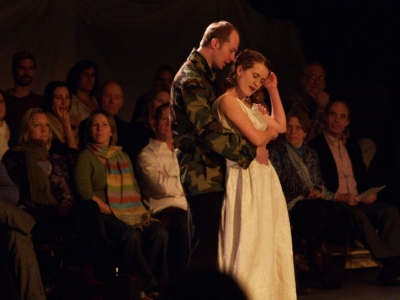Alum Kevin Poole Comes Home

When senior Phil Watson needed a director for his one-man distinction play, An Iliad by Lisa Peterson & Denis O'Hare (see story here), Kevin Poole (T’98) had just moved back to Durham from Colorado with his wife and twin girls after training at Naropa University and becoming immersed in Viewpoints theory. Watson had been exploring physical acting, with an emphasis on movement and voice and had done summer training in Viewpoints with SITI Company.
So it was an obvious choice to bring in Poole to direct Watson in the modern day retelling of Homer’s classic. He reflects here on his experience at Duke, his graduate experience, and working with Watson:
Studying and practicing theater at Duke enriched my college experience immensely. A thread within the fabric of my overall liberal arts education, theater provided a means to actively explore social issues by more deeply comprehending the complex relationships between individuals and systems within which those individuals operate; sometimes knowingly, often times not. Balancing practice with theory is a challenge within the field of theater in higher education and that tension played out well for me at Duke and also in graduate school.
A strong element of my graduate program, the MFA Theater: Contemporary Performance Program at Naropa University, was bringing awareness to my body-mind alignment. Before attending graduate school I felt disconnected from my body, which was problematic as a performer where my body was my instrument. Naropa gave me space to become a dancer, a mover, a composer of space and time. Inherent in the curriculum was the expectation to be a collaborative creator, not merely a follower, which required attuning my senses and thoughts to acute listening.
My foray into directing with An Iliad derived from the interplay between the creator and the listener within. My theater company in Colorado, Band of Toughs, consisted of a collaborative ensemble of creators and listeners. We challenged each other with our work to remain open, aware, and clear with our intention toward the audience.
Based on the ways in which I like to work stemming from early group collaborations at Duke, followed by working with numerous companies in Durham, graduate study at Naropa, and then most recently with my company, I found an approach with Phil that felt organic and productive. I saw us as fellow collaborators.
We began discussing the project over email in August, sharing thoughts, images, songs, and poems. Then in October we began rehearsing once a week until December when we slowly increased the number of rehearsals. The 'slow burn' of the process permitted us space to explore without judgment and delve into heavy subject matter.
I was excited to share my experiences in physical-based theater techniques, which Phil was interested in utilizing in the piece. By having a much longer than usual rehearsal period I was able to lead Phil in specific training methods and exercises so he could become familiar enough with the mechanics in order to create within them. We talked a lot about theater, and this play specifically, as a sporting event and the actor as the athlete. The physical training was an important component of how the show was built.
Looking back at myself as a senior undergrad, I was a lot less ambitious and confident than Phil is. He selected the play, committed throughout the creative process, and brought great ideas, design images, and intentions into the room daily. He gave me a lot to work off of, as a listener, from which we could then create and shape the piece.
While I can't speak for what other universities provide for senior majors, I'm impressed and proud of the support Duke, and specifically the Theater Studies department, gave to Phil for this project. Hiring a director and presenting in Sheafer for a project bridging theater and classical studies is a testament to the student-centered, research initiatives that make Duke a leader in undergraduate education.


